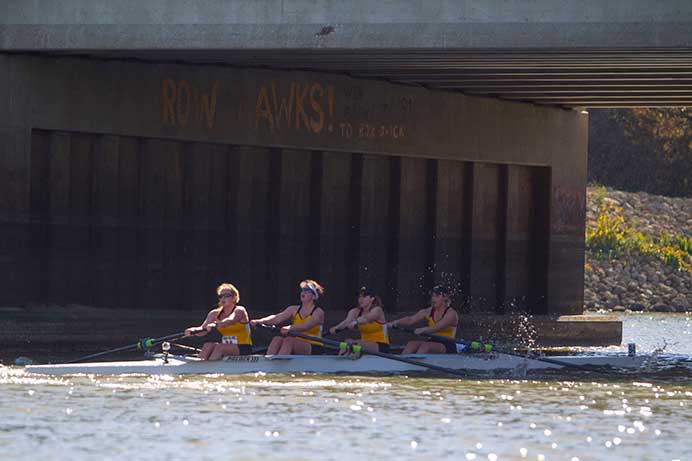College rowing is unlike most Division-1 athletics. Potential recruits don’t get scouted because of their rowing capabilities but rather, their athleticism. Iowa rowing thrives on these athletes.
Hawkeye rowing experienced its most successful season under head coach Andrew Carter last spring. A trip to the NCAA Championship in West Windsor, New Jersey, in May is fueling the Iowa rowers this fall. Their goal: to improve.
“I’ve seen kind of a little bit of switch in knowing what we can do and pushing our limits. We didn’t really dream big,” junior Rachel Canon said. “Last year, we decided to dream big and put all of our effort into each practice and just dream big.”
Iowa’s Class of 2021 provides Carter and his team with new athletes to achieve their goal. The sport has drawn around 60 people to try out on top of the recruits, Carter said.
“We look a lot at the character of the prospect. In order to fit into the culture of this team, which I think is as good, if not better than any in the country, I think we have a phenomenal group of people on this team. They get along incredibly, and [we want] someone that will fit into that and take it beyond where it is now,” Carter said. “Physically, they could be coming from a variety of different sports. More important than that, though, is the character of the person.”
Rowing thrives in finding “talent-transfer” athletes. This means that individuals with sports backgrounds can often easily transfer their skills to another sport. Carter looks for “coachable” athletes with a “relentless work ethic,” according to the Iowa women’s rowing website.
Izzy Bowman, a new freshman on the team, played soccer and ran track and cross-country in high school. Rowing provided her with the opportunity to continue her athletic career.
“I was recruited because I was athletic in high school,” she said. “I really like the team. It’s great to be a part of something that’s individual but you have to depend so much on that.”
Half of the U.S. Olympic rowing team at Rio were “talent-transfer” athletes, Carter said. Faith Wieland, a junior from Normal, Illinois, ran track and cross-country competitively in high school. After successful freshman and sophomore campaigns in high school, Wieland experienced a slew of injuries.
“I was a runner in high school, a long-distance runner, and I was meant to run at another university, but a few injuries progressed, and I ended up going on other visits to take my mind off of things,” Wieland said. “When I went to look at other schools and I looked at Iowa, and the same exact weekend there was a ‘learn to row’ clinic, and the coaches snagged me there. They told me that I should really get involved with this and that it was a great opportunity to switch sports and stay a collegiate athlete.”
That opportunity provided Wieland with a “team environment.”
“My favorite part is the team environment,” Wieland said. “As a runner you have your team, but you are individually judged. But with rowing everything revolves around the team. If we don’t stick together everything falls apart. It’s a really cool motivational factor.”
Rowing is unique in that there are no playmakers.



